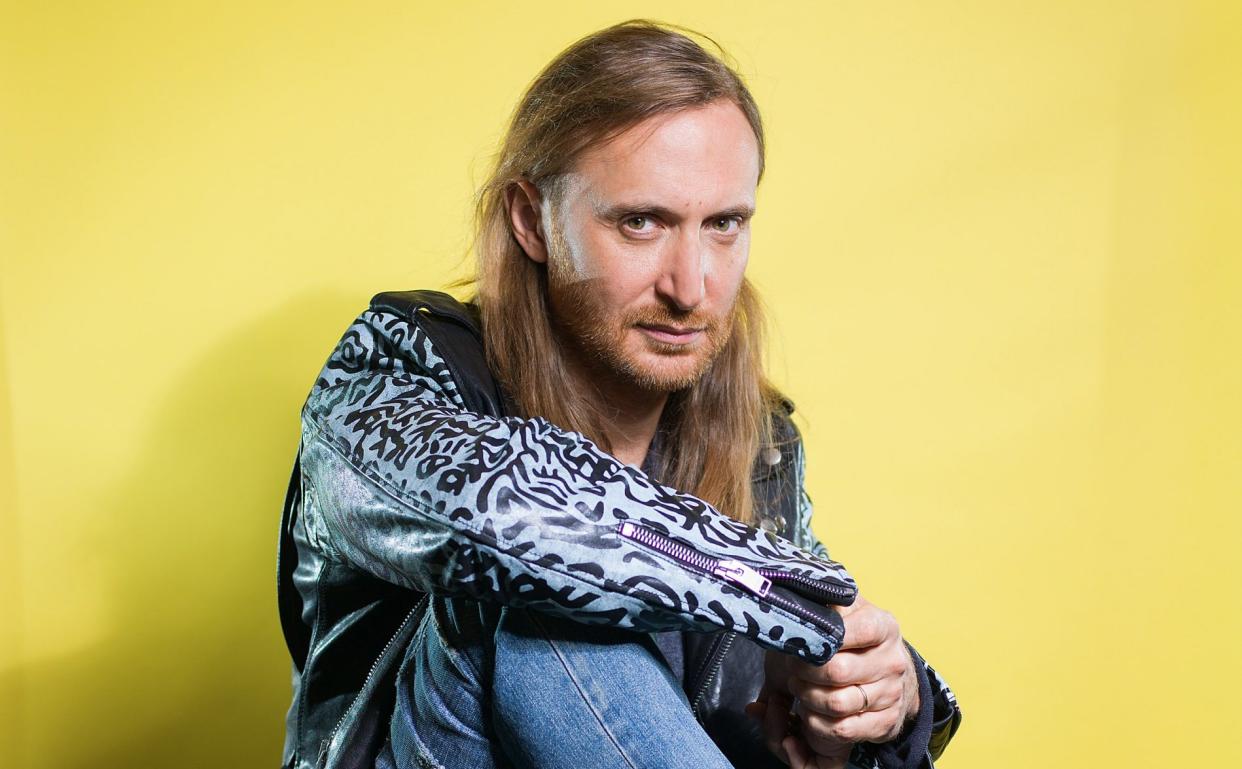Are David Guetta’s disposable disco songs really worth $100m? Incredibly, yes

- Oops!Something went wrong.Please try again later.
- Oops!Something went wrong.Please try again later.
Most readers would struggle to recognise David Guetta in the street, particularly since the French DJ chopped off his trademarks locks a few years ago. “Was that Bradley Cooper?” might be a typical comment as the well-manicured superstar walked by. “Nah. Harry Kane, wasn’t it?” might be a less generous one.
Guetta’s songs, though, are instantly recognisable. Chart-friendly house bangers like Titanium and When Love Takes Over are known from Liverpool to Lima. Guetta has sold over 50 million records, he’s had over 14 billion streams and worked with an eye-popping array of artists including Rihanna, Sia, Justin Bieber and Nicki Minaj. He's the eighth biggest artist on Spotify today. In the world of Electronic Dance Music (EDM), the genre formally known as dance music, Guetta is royalty.
And this week his global stock rose even further. Yesterday Guetta announced that he’d sold the rights to his back catalogue of songs to Warner Music Group, the label to which he was already signed. The new deal cost Warner around $100 million (£72 million) and also includes future recordings.
On the surface of it, $100m seems like an insane amount of money for some dance music. However we live in a world where the ownership of a song’s copyright and income interests has become big business. Song rights are being snapped up as assets to be sweated and monetised, aided by the rise of streaming and alternative platforms like TikTok and Peloton.
The Guetta deal is the latest in a long line of industry transactions. Last December, Universal Music Group spent a reported $300 million on Bob Dylan’s back catalogue. In recent months, Sony paid a nine-figure sum for Paul Simon’s songbook. Meanwhile music investment firms like Hipgnosis have spent hundreds of millions on all or part of the catalogues of musicians such as Neil Young, Blondie, Shakira and Mark Ronson. Hipgnosis’s founder Merck Mercuriadis told me earlier this year that a song is now a commodity to be viewed like gold or oil. It's boom time.
So what are Warner’s plans? Jean-Charles Carré, Guetta's manager, says the songs will be placed in “new contexts” and deals will be struck with new partners in new territories. What does this mean? It means Guetta’s songs will be used in films and TV soundtracks and on TV commercials and computer games. They could also be licensed to other artists for cover versions. New partners could range from online gaming platforms like Roblox to apps like Songclip and TikTok. Digital services in emerging markets like Tencent in China and Audiomack in Africa will become key platforms. And all this will happen in the context of the overall global streaming boom. The number of streaming subscribers around the world is set to grow from 416 million this year to 1.22 billion in 2013, according to Goldman Sachs.
So, yes, it’s a lot of money. But actually the economics for Warner look potentially tasty too.
The Guetta deal was for over 150 tracks, according to someone with knowledge of the deal, and this doesn’t include remixes and live versions. So let’s put the figure at 180 songs, for argument’s sake. At $100 million, this would mean that Warner has paid around $555,000 per track. One big advertising deal for a song would cover its cost in a single go. Or take films. Synchronisation fees to use a song in a film usually range from $15,000 to $60,000 but the figure can rise to over $500,000 if the title of a song used in the opening credits is also used as the film’s title, according to the American Society of Composers, Authors and Publishers.
Then there's gaming. A virtual Guetta gig on a game like Minecraft could net Warner millions. And let’s throw in the fact that copyright laws mean that royalties can be collected for 70 years after the death of the last co-composer (I’m assuming the Guetta deal reaches long into the future). Given that the DJ is a relatively-sprightly 53, then the copyright lifespan of his songs is about 100 years. With potentially a century of deal-making ahead, the $100 million figure looks like a steal.
Now, these speculative Guettanomics of mine are based on a huge assumption: that his music will still resonate long into the future. That, of course, is a big unknown. Will there be a Noughties EDM nostalgia boom in 2030? Quite probably. But the industry certainly believes that the genre has stronger legs over a longer term. Indeed, EDM is a hot area right now for acquisitive song publishing companies.
It’s easy to see why. Dance tracks have international reach, they cover a spread of genres (within the relatively tight stylistic tramlines of EDM) and come with a host of marquee names attached. These last two points are important as they suggest a broader catalogue than may be the case and give potential licensees greater choice. As well as Sia and Bieber, Guetta’s songs have featured Akon, Kelly Rowland, will.i.am, Kid Cudi, Estelle, Usher, Emili Sandé, John Legend, The Script, Anne-Marie, Jess Glynne and Stefflon Don to name just some.
The EDM catalogue market may well heat up further. Last October Calvin Harris, another hugely successful dance producer and DJ, sold his catalogue to Vine Alternative Investments for a reported $100 million. Like Guetta’s, Harris’s catalogue includes over 150 songs and is packed with collaborators. Other big players in the dance rights arena include BMG. BMG owns the Strictly Rhythm catalogue (which includes Ultra Naté’s Free and Josh Wink’s Higher State of Consciousness), and in 2014 it bought the catalogues of dance labels Skint and Loaded, including rights to the none-more-commercial Fatboy Slim archive (excluding North America). This was seven years ago – I’d love to know what the Fatboy Slim catalogue is worth today. Most of The Chemical Brothers’ catalogue is owned by Universal. What price for that? We’d surely be talking millions for both.

Indeed, commentators believe that this latest deal could mark a shift in how the catalogue market is viewed. To date it has been assumed that value lies in old catalogues by the likes of Young, Dylan and Simon. No longer, it seems. The Music Business Worldwide (MBW) website yesterday said that the acquisition strategy of Warner’s publishing division appears to be leaning towards hits created in the last twenty years. Warner already administrates the rights of DJ Steve Aoki’s publishing business, Dim Mak Publishing, and it recently bought a majority stake in a portfolio of Bruno Mars songs.
“Some industry observers believe music like Guetta’s best-known hits (released around 2009-2011) will ultimately be stung by a “decay” in popularity over the coming decade,” Music Business Worldwide said. “Others, however, point to the fact that a tune like Guetta’s Titanium (feat Sia) was released 10 years ago, and continues to maintain a handsome level of streaming popularity.”
Interestingly, MBW pointed out that Hipgnosis appears to be doing the opposite: it is currently focusing on buying older songs. We’ll see. But the market for song rights will continue to expand and morph in dizzying new ways. There is no question about that.
Did David Guetta good deal? He certainly did. But so did Warner. You thought dance music was all about sweaty nightclubs? Think again. Our jaws will continue to hit our desks at the vast amounts of money being spent. Even if you still wouldn’t recognise the DJs in the street.

